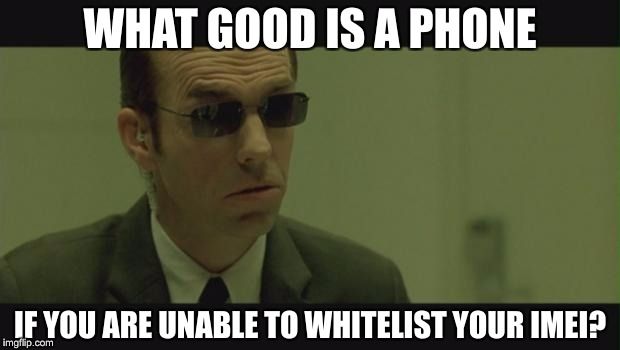Mobile phone IMEI whitelisting in Chile and elsewhere
Shortly after arriving in Chile recently, I was dismayed to discover that – due to a new law – my Aussie mobile phone would not work with a local prepaid Chilean SIM card, without me first completing a tedious bureaucratic exercise. So, whereas getting connected with a local mobile number was previously something that took about 10 minutes to achieve in Chile, it's now an endeavour that took me about 2 weeks to achieve.
It turns out that Chile has joined a small group of countries around the world, that have decided to implement a national IMEI (International Mobile Equipment Identity) whitelist. From some quick investigation, as far as I can tell, the only other countries that boast such a system are Turkey, Azerbaijan, Colombia, and Nepal. Hardly the most venerable group of nations to be joining, in my opinion.
As someone who has been to Chile many times, all I can say is: not happy! Bringing your own mobile device, and purchasing a local SIM card, is the cheapest and the most convenient way to stay connected while travelling, and it's the go-to method for a great many tourists travelling all around the world. It beats international roaming hands-down, and it eliminates the unnecessary cost of purchasing a new local phone all the time. I really hope that the Chilean government reconsiders the need for this law, and I really hope that no more countries join this misguided bandwagon.

Image source: imgflip.
IMEI what?
In case you've never heard of an IMEI, and have no idea what it is, basically it's a unique identification code for all mobile phones worldwide. Historically, there have been no restrictions on the use of mobile handsets, in particular countries or worldwide, according to the device's IMEI code. On the contrary, what's much more common than the network blocking a device, is for the device itself to block access to all networks except one, due to it needing to be unlocked.
A number of countries have implemented IMEI blacklists, mainly in order to render stolen mobile devices useless – these countries include Australia, New Zealand, the UK, and numerous others. In my opinion, a blacklist is a much better solution than a whitelist in this domain, because it only places an administrative burden on problem devices, while all other devices on the network are presumed to be valid and authorised to connect.
Ostensibly, Chile has passed this law primarily to ensure that all mobiles imported and sold locally by retailers are capable of receiving emergency alerts (i.e. for natural disasters, particularly earthquakes and tsunamis), using a special system called SAE (Sistema de Alerta de Emergencias). In actual fact, the system isn't all that special – it's standard Cell Broadcast (CB) messaging, the vast majority of smartphones worldwide already support it, and registering IMEIs is not in any way required for it to function.
For example, the same technology is used for the Wireless Emergency Alerts (WEA) system in the USA, and for the Earthquake Early Warning (EEW) system in Japan, and neither of those countries have an IMEI whitelist in place. Chile uses channel 919 for its SAE broadcasts, which appears to be a standard emergency channel that's already used by The Netherlands and Israel (again, countries without an IMEI whitelist), and possibly also by other countries.
The new law is supposedly also designed to ensure (quoting the original Spanish text):
…que todos los equipos comercializados en el país informen con certeza al usuario si funcionarán o no en las diferentes localidades a lo largo de Chile, según las tecnologías que se comercialicen en cada zona geográfica.
Which translates to English as:
…that all commercially available devices in the country provide a guarantee to the user of whether they will function or not in all of the various regions throughout Chile, according to the technologies that are deployed within each geographical area.
However, that same article suggests that this is a solution to a problem that doesn't currently exist – i.e. that the vast majority of devices already work nationwide, and that Chile's mobile network technology is already sufficiently standardised nationwide. It also suggests that the real reason why this law was introduced, was simply in order to stifle the smaller, independent mobile retailers and service providers with a costly administrative burden, and thus to entrench the monopoly of Chile's big mobile companies (and there are approximately three big players on the scene).
So, it seems that the Chilean government created this law thinking purely of its domestic implications – and even those reasons are unsound, and appear to be mired in vested interests. And, as far as I can see, no thought at all was given to the gross inconvenience that this law was bound to cause, and that it is currently causing, to tourists. The fact that the Movistar Chile IMEI registration online form (which I used) requires that you enter a RUT (a Chilean national ID number, which most tourists including myself lack), exemplifies this utter obliviousness of the authorities and of the big telco companies, regarding visitors to Chile perhaps wanting to use their mobile devices as they see fit.
In summary
Chile is now one of a handful of countries where, as a tourist, despite bringing from home a perfectly good cellular device (i.e. one that's unlocked and that functions with all the relevant protocols and frequencies), the pig-headed bureaucracy of an IMEI whitelist makes the device unusable. So, my advice to anyone who plans to visit Chile and to purchase a local SIM card for your non-Chilean mobile phone: register your phone's IMEI well in advance of your trip, with one of the Chilean companies licensed to "certify" it (the procedure is at least free, for one device per person per year, and can be done online), and thus avoid the inconvenience of your device not working upon arrival in the country.